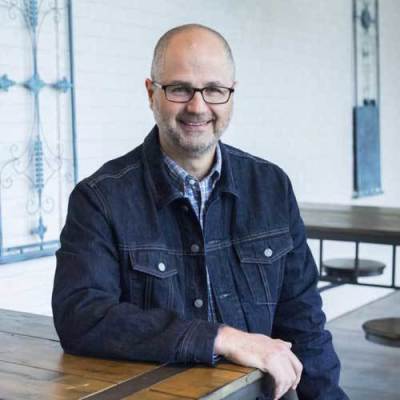It is still well with my soul

Horatio Spafford, an attorney and minister, was also a man who knew suffering. After losing four daughters in a tragic Atlantic Ocean shipwreck, he lamented his “sorrows like sea billows” through the writing of a now-famous hymn, “It Is Well With My Soul.” This particular hymn has resonated throughout the generations, especially during unprecedented times like these as the world battles a global pandemic. Just days ago, some of our friends and Nashville neighbors posted a masterful rendition of the hymn as a gift to us in a season of anxiety and lament.
Like most time-tested hymns, as well as every book of the Bible, “It Is Well” was created from a place of deep pain. Whenever our church sings it together, I look around the congregation to see how it is impacting our people. Without fail, those who sing the hymn with the most gusto are the sufferers. People battling cancer, mental illness, addiction, bereavement, social rejection, unemployment, COVID-19 fears, and any number of other trials, bellow the lyrics in such a way that says, “This is my song.”
What enables these afflicted souls to keep singing? What empowers them to keep hoping, to keep believing and to keep pressing forward in the face of gut-wrenching, heart-breaking, life-busting circumstances and cry out from the gut, “It is well...?” It is nothing more and nothing less than the promises of Scripture passed on to us by fellow sufferers, combined with the animating work of the Holy Spirit pressing these promises into their hearts and daily lives.
At Christ Presbyterian Church, the family of believers in Nashville that I have the privilege of serving as pastor, there are scores of people who have endured deep sorrow and loss and who have done so exceptionally well. It’s not that these men and women have denied suffering or somehow swept its assaulting realities under the rug. Like Jesus at the tomb of his friend Lazarus, they have let themselves feel the anger and sadness of their losses, with weeping and even an anger that says, “This is not ok. This is not how things are supposed to be.” Along with this, they have also joined the chorus first penned by the Apostle Paul when he wrote, “O death, where is your victory? O death, where is your sting?” (1 Corinthians 15:55). With similar strength, the oft-persecuted and maligned and imprisoned and thorn-in-the-flesh assaulted Apostle wrote:
“We are more than conquerors through him who loved us. For I am sure that neither death nor life, nor angels nor rulers, nor things present nor things to come, nor powers, nor height nor depth, nor anything else in all creation, will be able to separate us from the love of God in Jesus Christ our Lord” (Romans 8:37-39).
My friend and singer-songwriter, Sandra McCracken Nicholson, captures this sentiment marvelously in her song, “Fools Gold,” in which she sings, “If it’s not okay, then it is not the end. And this is not okay, so I know this is not the end.” Put another way, while death, mourning, crying, pain, sorrow, and pandemics may afflict us for a time, they do not get to dictate God’s storyline.
All believers in Christ are currently living in a middle chapter of God’s Story. The middle chapters, like all good stories, are fraught with drama and setback and angst and loss. And yet, the final chapter — which happens to be a chapter that has already been written — is the chapter of “world without end.” It is the chapter that goes on forever, and that promises what another singer-songwriter friend, Jeremy Casella, calls, “death in reverse.” Indeed, it turns out that Tolkein’s notion of everything sad coming untrue...is true. And C.S. Lewis’ parallel notion of the last and everlasting chapter being one in which every day is better than the day before...is also true.
As a pastor, I’ve had the privilege of sitting with people in their final moments. These are valiant souls facing our worst and final enemy with both sobriety and hope. Deteriorating from terminal cancer, the 35-year old Brian says to me, “I’ve learned to thank God for the good I cannot see.” Al, another cancer victim in his early sixties, pledges to wear his “Happy Socks” every day for the remainder of his life as a reminder that sickness, sorrow, pain and death will not get the last word...but resurrection will. Susan, a third cancer victim, peacefully thanks God for the life he has given her, plans her own funeral — the prayers, the songs and hymns, the Scriptures — with a note of joy that she, through her own death, will get to tell those she leaves behind one more time that “it is well” because of Christ who died, who is risen, and who will come again. John, who is fading rapidly in the later stages of ALS, says that he is just as happy now as he has ever been. “I’ve been a Bible reader all of my life,” he says, “and somewhere along the way, I guess it all sunk in.” Janet, whose dementia is progressing quickly, says that her greatest fear is that she will forget Jesus. Her husband grabs her hand and reminds her that even if she does forget Jesus, Jesus will never forget her.
And the saints cry, “It is well, it is well with my soul.”
For better and for worse, in joy and in sorrow, in sickness and in health, may we never forget — especially in times of pandemic, instability, loss, and even death — that the promises of God remain true yesterday, today and forever. Not one of those promises risks being negated by horrible circumstances or tragedies, even by losses as tragic as those endured by Horatio Spafford and his wife. In fact, such tragedies, in the hearts and through the stories and lyrics of hope written, have the effect of establishing the promises of God. While there are things that can temporarily “distance” us from our health, our family and friends, our financial security, and even from this world, nothing in all creation will ever be able to distance us from the love of God that is in Christ Jesus. If this was true for Paul who “faced death all day long,” then it must also be true for us.
Indeed, this pandemic and all other forms of pandemonium are not okay. And if it’s not okay, then it is not the end.
Scott Sauls is senior pastor of Christ Presbyterian Church in Nashville, Tennessee. He is the author of several books including “A Gentle Answer,” which is now available for pre-order. You can also visit his website at scottsauls.com.




























